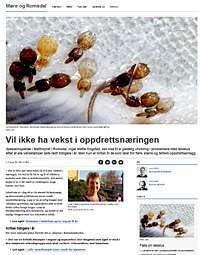How much does reputation really count for?

How does the aquaculture industry's reputation affect potential for further growth and development? Social researcher Marit Schei Olsen's doctoral thesis revolves around how public discourse shapes the industry's framework conditions.
Even though farmed salmon as a product has a reasonably good reputation, the aquaculture industry itself is facing challenges, particularly in connection with issues relating to the environment and sustainability.
Public perception of industry influences policy
NTNU Samfunnsforskning AS, a research institute owned by the Norwegian University of Science and Technology, is heading the three-year project "Sustainable aquaculture – regulation and reputation (STARR)". Social researcher Marit Schei Olsen, a doctoral fellow under the Research Council of Norway's HAVBRUK programme, is studying how public discourse shapes important policy decisions for the aquaculture industry.
"I am not taking any position on whether or not the industry deserves its reputation," says Ms Schei Olsen. "But the industry's reputation with regard to sustainability issues becomes a significant problem when it affects policy and the framework conditions for aquaculture activity."
At times critics have argued that the ties between the industry, political community and public administration are too close. One debate centred on former Minister of Fisheries and Coastal Affairs Lisbeth Berg-Hansen's ownership interests in salmon farming.
"The question is whether this kind of connection is a problem, or whether it actually helps towards developing further industrial competency," says Ms Schei Olsen.
What matters most – and where?
In her recently launched doctoral project, the social researcher aims to identify the processes involved in designing and legitimising the authorities' management regime for aquaculture.
"Currently there is general agreement on the importance of Norway's aquaculture industry. Still, there is a lot of policy linked to the industry, not least to factors involving employment and regional policy," explains the Ph.D. student.
As a backdrop for her work Ms Schei Olsen is studying the media discourse of recent years. She has not yet settled on a final topic but finds it tempting to examine the recent granting of "green" operator licences (with stricter environmental requirements) more closely.
"I want to map topics and issues highlighted in the public debate, find out which topics are of greatest importance, and identify the arguments presented by the various stakeholders," says Ms Schei Olsen. "Another objective is to discover in which arenas the most meaningful discussions actually take place and who is involved – in other words, how and where the decisions are really taken."
Provided by The Research Council of Norway















.jpg)




